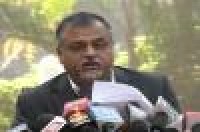Not buying the Zee story

This is an expanded version of the column in Mint, November 29, 2012
TALKING MEDIA
Sevanti Ninan
Time was when dog did not eat dog in the media biradiri. No longer. Zee News’ misadventures with Mr Naveen Jindal have had fellow journalists of all shades pouncing on the group and its editors who are locked away briefly in custodial arrest. On the 28th night every news channel was in full swing, pillorying Zee News for seeking martyrdom in a most dubious case.
For media power to move a government it has to demonstrate collective clout. There has been fascinating evidence of that in the last ten days. Four arrests, and the surfacing of news of an older arrest, have in some sense put the United Progressive Alliance government on the back foot. But not all the arrests made are invoking the same degree of anger and indignation.
Some narratives of free speech violation the media buys into, others is it considerably more skeptical about. A press conference held by Zee News Wednesday morning fell in the latter category, with attempted comparisons made with the clampdown on free speech during the Emergency, cutting no ice at all with the journalists present.
The police have been looming rather large in the lives of social media using citizens over the last fortnight, and that role expanded on Tuesday to include mainstream media. Arrests happened again, for the second time in less than ten days as two editors of the Zee group channels were marched off to the clinker for two days of custodial arrest, on the grounds that they were not cooperating with police questioning.
The first incident involved two girls using Facebook, one to state a perfectly defensible opinion, the other to agree with her. They ended up getting arrested, but the resulting outrage saw rapid response: the superintendent of police of Thane rural, responsible for the arrests, was suspended, and the magistrate who gave bail to the two girls instead of throwing the case out, was transferred.
So far the Zee group has not had much success in making the second pair of arrest sound equally indefensible. It’s a tougher fight: not social media defenders versus rural police, but a powerful media magnate up against an industrialist and ruling party MP, a man hardly less powerful. Proprietor Subhash Chandra has also been named in the case.
But the televised press conference was interesting. Though the chief executive officer of Zee News attempted to embrace the gathered hacks with a we-are-all-in-this-together kind of opening line—“dear friends, fellow media professionals, you are part of the media” etc. etc—it left them unmoved. The questions that followed the opening statements were not, shall we say, fraternal. They did not seem to buy the ‘government trying to gag the media’ story. It is certainly the first incident in memory where arrests of senior journalists have not had other journalists expressing instant solidarity.
Before the press conference began the secretary general of the Broadcast Editors Association (of which one of the two arrested journalists was an office bearer until recently) was carefully distancing himself on TV: “this is an individual lapse, it is not a reflection on the media.” He wasn’t even decrying the arrests.
The case is sub judice, so commenting on its merits is not warranted. But allegations of extortion and conspiracy have been made by Congress MP Naveen Jindal whose coal block allocations were being investigated at length by the channel. A sting conducted by the MP showed snatches of the two editors allegedly discussing a deal involving advertising in exchange for laying off the story. An FIR has been filed against the two channels, and the sting tape has been authenticated now by the Central Forensic Science Laboratory.
On November 28 Zee News’ opening statement at the press conference said, astonishingly, that Jindal’s mother had brought “emotional pressure” to bear on Jawahar Goel of the Zee Group to lay off on the barrage of stories, following which Goel had asked his news channels to hold the exposure and get Jindal’s side of the story. But Jindal, allegedly, did not cooperate.
The journalists attending the press conference found this quite amazing. And asked a series of unflattering questions. It does not seem at this point that the media is inclined to turn these arrests into a free speech issue. Solidarity is selective when credulity is stretched.
In its twentieth anniversary year Mr Subhash Chandra’s mighty Zee empire is facing an extraordinary situation. Shortly after weeks of celebratory coverage, it finds its reputation tarnished by allegations of extraordinarily unethical behavior. Two editors presiding over two of its news channels have been accused of attempted extortion. The company did not distance itself when the allegations first surfaced, it continues to defend its senior journalists. Leaving many to suspect that they were acting on on behalf of the company.
Their lawyer was arguing on Wednesday that the mere certifying by the CFSL that the tape in which they featured was not tampered with, was not enough reason to arrest the journalists when the case was still in progress and the two men were cooperating with the investigation. But the police have argued non cooperation. The new Information and Broadcasting minister has made cold noises about the case taking its course, rather than conciliatory ones about the government respecting press freedom.
But for the UPA to backtrack on its current course of action the government will have to feel collective heat from the media. That does not seem to be forthcoming. Because the profession is inclined for the moment to discriminate between the serious and genuine free speech issues which exist, and patently trumped up ones seeking cover for questionable activities.